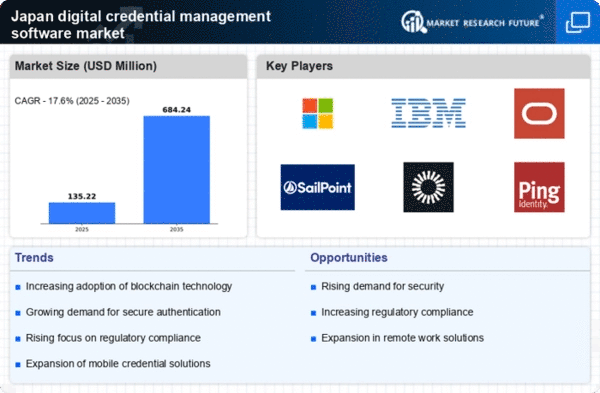Growing Cybersecurity Concerns
The digital credential-management-software market in Japan is being propelled by escalating concerns regarding cybersecurity threats. With the rise in cyberattacks targeting sensitive information, organizations are increasingly prioritizing the protection of digital identities. This heightened awareness has led to a greater emphasis on implementing robust credential management systems that can mitigate risks associated with data breaches. According to industry reports, nearly 60% of Japanese companies have reported experiencing some form of cyber incident in the past year. This alarming statistic underscores the urgent need for effective digital credential management solutions. As businesses strive to safeguard their assets and maintain customer trust, the demand for advanced software solutions in this market is expected to grow, reflecting a proactive approach to cybersecurity.
Emergence of Blockchain Technology
The emergence of blockchain technology is poised to have a transformative impact on the digital credential-management-software market in Japan. Blockchain offers a decentralized and secure method for managing digital identities, which aligns with the growing demand for transparency and trust in digital transactions. As organizations explore innovative ways to enhance their credential management processes, the integration of blockchain technology appears to be a promising avenue. This technology not only enhances security but also streamlines verification processes, potentially reducing operational costs. Market Research Future suggest that the adoption of blockchain-based solutions could lead to a significant shift in how digital credentials are managed, thereby driving growth in the digital credential-management-software market.
Government Initiatives and Support
Government initiatives in Japan are significantly influencing the digital credential-management-software market. The Japanese government has been actively promoting digital transformation across various sectors, which includes the implementation of digital identity systems. Initiatives such as the My Number system, which aims to streamline administrative processes and enhance citizen services, are indicative of this trend. The government's commitment to fostering a digital economy is likely to bolster the adoption of credential management solutions. Furthermore, funding and support for technology startups in this domain are expected to stimulate innovation and competition. As a result, the digital credential-management-software market is anticipated to benefit from these supportive measures, potentially leading to an increase in market penetration and user adoption.
Rising Demand for Digital Identity Solutions
The digital credential-management-software market in Japan is experiencing a notable surge in demand for digital identity solutions. This trend is largely driven by the increasing need for secure and efficient identity verification processes across various sectors, including finance, healthcare, and education. As organizations seek to enhance their security measures, the adoption of digital credential management systems is becoming essential. According to recent data, the market is projected to grow at a CAGR of approximately 15% over the next five years. This growth is indicative of a broader shift towards digitalization, where traditional methods of identity verification are being replaced by more advanced, technology-driven solutions. Consequently, the digital credential-management-software market is positioned to play a pivotal role in shaping the future of identity management in Japan.
Shift Towards Remote Work and Digital Services
The digital credential-management-software market is witnessing a transformation driven by the shift towards remote work and the increasing reliance on digital services. As organizations adapt to new work environments, the need for secure access to digital resources has become paramount. This shift has prompted businesses to invest in credential management solutions that facilitate secure remote access while ensuring compliance with security protocols. Data indicates that approximately 70% of Japanese companies have adopted remote work policies, further emphasizing the necessity for effective digital identity management. Consequently, the digital credential-management-software market is likely to expand as organizations seek to enhance their operational efficiency and security in a predominantly digital landscape.
















